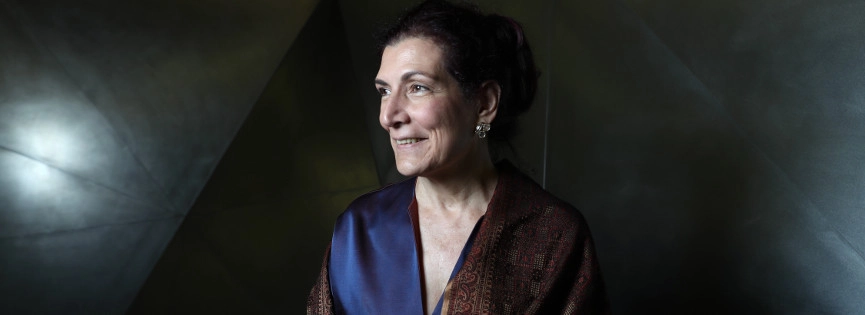Main content
Alma Guillermoprieto 2018 Princess of Asturias Award for Communication and Humanities

Your Majesties,
Distinguished and Illustrious Authorities,
Dear Laureates,
Ladies and Gentlemen,
The day that brought the strangest wake-up call of my life, at 4:30 in the morning, with the implausible news that this award was for me, I realized that, in fact, the Princess of Asturias Foundation was a hub for weaving: it weaves a web that intertwines French and Spaniards, Americans and Poles, Swedes and Mexicans, and, through us, binds the world together a little more. This seems a very good thing to me, because I am one of those people who believe in maths: in these times of division, together we add up to more. So, thank you, Your Majesties, for this honour, and my thanks also to all the members of the Princess of Asturias Foundation team for their diligent and caring help.
From the very day the Award was announced, I also became aware of the fact that, in my case, I did not have to bear the weight of this tremendous accolade on my own, but rather that it was granted to me as a reporter, one among many. And I am infinitely happy for this recognition of a profession that can only be entered into with great expectations and dreams: to see the world, to change history, to be heroic… Reality is more constricted: the pay is low; in an era in which the world is immersed in a technological, cybernetic and scientific revolution, we have no certainties to rely on and the world cares little for us; we work from sunrise to sunset, although, if the truth be told, this suits us; and there is great confusion as to what our role should be. In this respect, we are a true reflection of society in general. And yet, we are necessary, for the very reason that there is so much confusion.
A world in which the major powers become involved in the decisions of smaller countries, in which there is child trafficking, in which desperate migrants who reach our borders are driven back into the sea or the desert. A world in which we are necessary in order to chronicle these horrors. It is also a world in which we urgently need to prepare ourselves to make terrible ethical decisions. Is life which is generated in a laboratory actually life? Should research leading to the creation of artificial intelligence superior to that of humans be regulated?
If it were not for us reporters, how would you find out about these and all the other facts, deeds and challenges that occur outside of your immediate environment? Without the media, the world would live in a kind of 11th century, each one of us isolated in our hamlet or castle, each just as ignorant as the other, convinced that sirens are as real as rhinoceroses. Without powerful, well-funded journalism that is respected by governments, the modern-day world, the interlinked world, would be impossible.
Nevertheless, in this profession, it is hard not just to make a living, but to survive. This year 45 reporters have been murdered, because someone did not like what they said about them. A year and a half ago, in Madrid, I was returning to the hotel after the Ortega y Gasset Awards Ceremony when I was told that my brave, uncompromising friend, Javier Valdez, had been shot in Mexico, in the city of Culiacán, the cradle of drug-trafficking in my country. It was as if the light of the world had been snuffed out. These murders, which always go unpunished, kill not only the victims, but also kill all those around them a little. Of course, that is also the aim. They kill one to intimidate us all.
However, I am here to convey that where they kill one reporter, in the long run, two usually rise up…or at the very least, one does. In the past, I used to try to dissuade young people who told me they wanted to become journalists, because of the great danger it entailed, because of the technological changes, because it doesn’t pay well, because… oh, why not do something easier and live a quiet life? Today, however, I tell you, dedicate yourself to it, just go for it; because we narrate the history of the world every day. Because we chronicle what others wish to cover up. Because we are the antidote to social networks, with their immediacy and propagation of hate. Because we are essential. Because the world can be seen, because while we may not be able to set history right, we can give an account of it, we can be heroic. Because the future of this profession is being invented today by the colleagues who are starting out; and a truly generous vocation awaits you, one which will offer up treasures at every turn.
A boy in an impoverished Brazilian slum who puts on his carnival costume for the first time. A more than tipsy presidential candidate squeezing up close to a cholita in a miniskirt while dancing huaynos. A caravan of mothers searching, year after year, for their missing children in the Mexican desert. An observatory in the Atacama A desert where some men work at measuring the size of the universe by looking through mirrors. A mist-shrouded plateau in the Colombian highlands which conceals guerrillas as well as an infinite variety of orchids. No other profession like this one will offer you a world, a universe, the whole of reality: tragic, embarrassing, stubborn, hilarious, horrendous, magical. The gift of actual reality, immense and wonderful. I am grateful to my profession for these forty years of hard work; I am grateful to my colleagues –the reporters in the street and, in particular, my beleaguered colleagues in Venezuela, Nicaragua and Mexico, whom I greatly admire– and to you all for hearing me out.
Thank you, Your Majesties.
Translated by Paul Barnes.
End of main content
